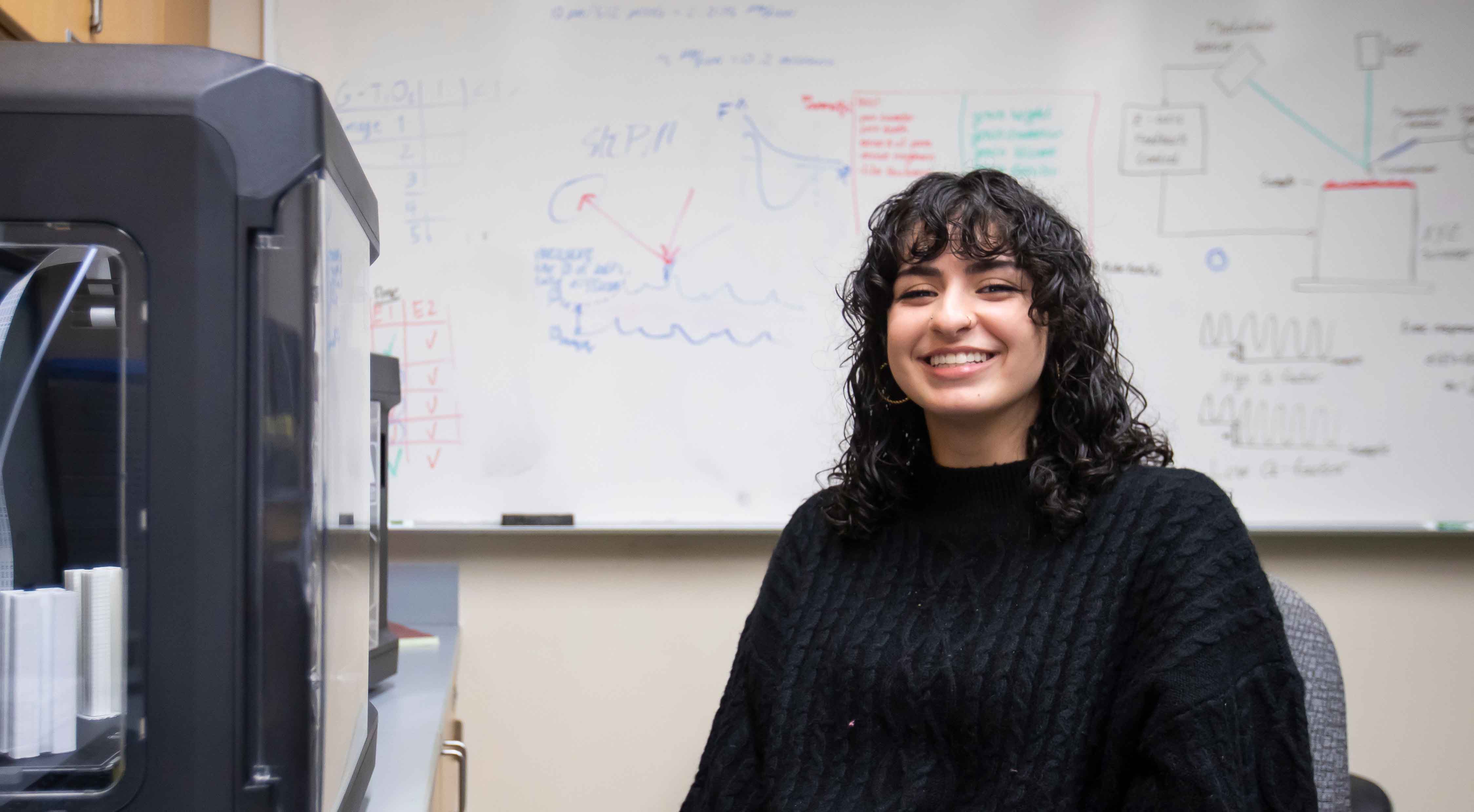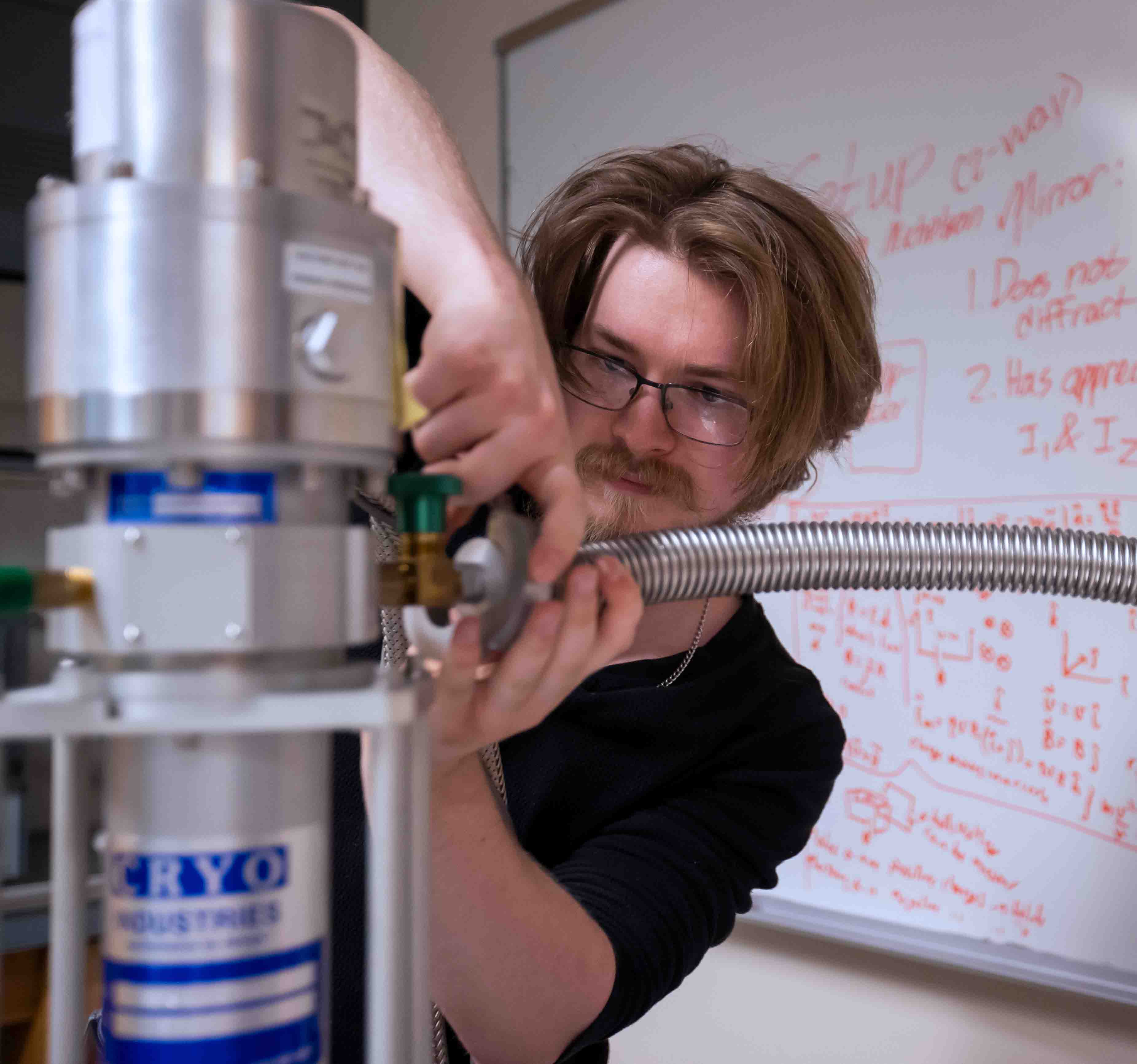B.S. Physics Program Map

General Concentration (Pre-calc Start)
Physicists conduct research into the basic laws of nature or use existing knowledge about the physical world to develop applications and to design new products. A degree in physics prepares the student for a career in physics or related job industry, a governmental lab, teaching, as well as for further graduate study.
Stats
60
Core Credit Hours
47
Major Credit Hours
13
Elective Credit Hours
- Plan Your Degree
- Crush Your Course
- Find Your Place
- Broaden Your Perspectives
- Connect Off-Campus
- Take Care of Yourself
- Pave Your Path
Plan Your Degree
Disclaimer: This program map is intended ONLY as a guide for students to plan their course of study. It does NOT replace any information in the Undergraduate Catalog, which is the official guide for completing degree requirements.
| Course Name | Credit Hours |
|---|---|
|
C1: ENGL 1101
English Composition I |
3 |
|
M: MATH 1113
Precalculus |
4 |
|
XIDS 2002
First-Year Seminar |
2 |
|
I2: XIDS 2001
The Physical Universe |
1 |
|
T1: CHEM 1211 + Lab
Principles of Chemistry I |
4 |
Milestones:
- Complete ENGL 1101 with a C or better.
- Complete MATH 1113.
| Course Name | Credit Hours |
|---|---|
|
C2: ENGL 1102
English Composition II |
3 |
|
T2: CHEM 1212 + Lab
Principles of Chemistry II |
4 |
|
T3: MATH 1634
Calculus 1 |
4 |
| B1: Oral Communications | 3 |
Milestones:
- Complete ENGL 1102 with a C or better.
- Complete Calculus I.
15 Fall Credit Hours + 17 Spring Credit Hours = 32 Credit Hours
| Course Name | Credit Hours |
|---|---|
|
F: PHYS 2211 + Lab
Principles of Physics I |
4 |
|
F: MATH 2644
Calculus II |
4 |
| A: Humanities | 3 |
| P: Citizenship | 3 |
| Course Name | Credit Hours |
|---|---|
|
F: PHYS 2212 + Lab
Principles of Physics II |
4 |
|
MATH 3303
Ordinary Differential Equations |
3 |
|
F: MATH 2654
Calculus III |
4 |
| A: Humanities | 3 |
Milestones:
- Complete the Introductory Physics sequence.
- Complete Math up to Calculus III.
14 Fall Credit Hours + 14 Spring Credit Hours = 28 Credit Hours
| Course Name | Credit Hours |
|---|---|
|
PHYS 3503
Modern Physics |
3 |
|
PHYS 3113
Mechanics |
3 |
|
PHYS 4513 OR 4523
Mathematical Physics or Computational Physics |
3 |
| Math OR Foreign Language Elective | 3 |
| P: Citizenship | 3 |
| Course Name | Credit Hours |
|---|---|
|
PHYS 3213
Thermodynamics |
3 |
|
PHYS 3133
Electricity and Magnetism |
3 |
| Math OR Foreign Language Elective | 3 |
| PHYS Elective | 3 |
| S: Social Science | 3 |
15 Fall Credit Hours + 15 Spring Credit Hours = 30 Credit Hours
| Course Name | Credit Hours |
|---|---|
|
PHYS 4513 OR 4523
Mathematical Physics or Computational Physics |
3 |
|
PHYS 3511
Experimental Physics I |
1 |
| PHYS Elective | 3 |
| PHYS Elective | 3 |
| Elective | 3 |
| S: Social Science | 3 |
| Course Name | Credit Hours |
|---|---|
|
PHYS 3521
Experimental Physics II |
1 |
|
PHYS 4984
Physics Seminar |
1 |
|
Electives
(10 hours of Electives) |
10 |
| PHYS Elective | 3 |
| PHYS Elective | 3 |
16 Fall Credit Hours + 18 Spring Credit Hours = 34 Credit Hours
Crush Your Course
First Year:
- Enroll in XIDS 2001: Physical Universe and Core IMPACTS courses.
- Complete math courses through Calculus 1.
- Take Principles of Physics 1 (or ASTR 2313) in your second semester.
- Attend physics workshops.
- Meet with your Physics mentor.
Middle Years:
- Complete Principles of Physics.
Take Modern, Mathematical, Mechanics, E&M and Thermal. - Establish your pathway/concentration.
- Take core and electives to balance upper-level coursework.
Last Year:
- Finish your degree requirements.
Complete your research/internships. - Present at a conference.
- Write a scientific paper.
- Finish strong.
Find Your Place
First Year:
- Meet Physics faculty and learn about their research and scholarship opportunities.
- Join the Physics Engineering club.
- Connect with junior/senior/physics students and ambassadors.
Middle Years:
- Become a Student Assistant for a physics lab, workshops, or the Observatory.
- Get involved in research or an internship.
- Apply for summer internships or REUs.
- Attend a scientific conference.
Last Year:
- Become a Physics Ambassador.
- Expand your professional network.
- Apply for internships in local industries or graduate programs.
- Attend career fairs. Send your resume to one of our alumni.
Broaden Your Perspectives
First Year:
- Check out the education abroad office.
Middle Years:
- Consider a study abroad program. Check out students’ stories of their experiences.
Last Year:
- Assess your cultural competency.
- Consider working abroad and research visa regulations.
- Explore practices of creating more inclusive careers.
Connect Off-Campus
First Year:
- Visit Wolves Vote to learn about the voting process and registration.
- Consider volunteering for a campaign or organization in your community.
Middle Years:
- Complete an internship in your field.
- Consider a summer or part-time job.
- Ask your department about networking opportunities with alumni.
Last Year:
- Ask for advice from professionals in your field of interest.
- Explore career shadowing opportunities.
Take Care of Yourself
First Year:
- Visit the Center for Integrative Wellness to find all the resources available to you!
- Visit Health Services.
- Get fit! Visit URec to see all your options.
- Visit the Center for Economic Education and Financial Literacy.
Middle Years:
- Take a fitness class, climb the rock wall, or join an intramural team.
- Consider whether counseling is right for you: take a mental health screening.
Last Year:
- Explore a farmer’s market for fresh produce.
- Develop a post-graduation exercise plan.
- Explore your loan repayment options and complete your exit counseling.
Pave Your Path
First Year:
- Complete a self-assessment to see what careers and majors are right for you.
- Visit Career Services.
- Create your profile on Handshake.
- Consider applying for an on-campus job.
Middle Years:
- Draft your resume and attend a resume blitz.
- Learn about how to network on social media and update your Handshake profile.
- Draft your personal statement.
- Visit the graduate school to find out about graduate programs and admission requirements.
Last Year:
- Request references from professors and supervisors.
- Draft your resume cover letter and personal statement and revise it with career services.
- Attend business fairs and career fairs at UWG and across the state.
- Attend an interview workshop.
- Apply for graduate programs.
Careers

Career Opportunities
This degree may help you get work as the following:
- Aerospace Engineer
- Astronomer
- Data Scientist
- Geophysicist
- Lab Manager
- Medical Physicist
- Optical Engineer
- Physics Teacher
- Professor
- Research Scientist
HeadingSub-Heading
Have any questions about your major?
Don't forget to check out Wolf Watch to explore degree requirements!
